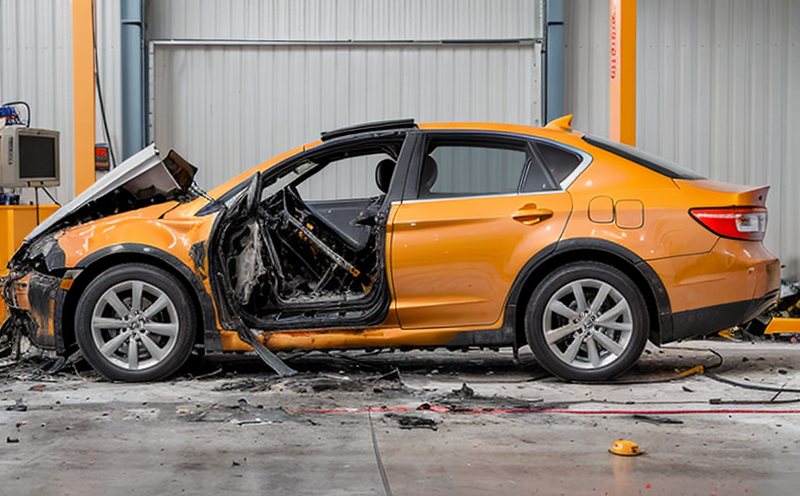KS C IEC 62133 Mechanical Shock Testing of Portable Rechargeable Batteries
The KS C IEC 62133 standard is crucial in ensuring the safety and reliability of portable rechargeable batteries. This test evaluates how these batteries withstand mechanical shocks, which are common occurrences during transportation, handling, and use. Compliance with this standard ensures that batteries meet stringent safety requirements set by international bodies.
The test involves simulating real-world conditions through controlled impacts to assess the battery's resilience. The process typically includes dropping the battery from a specified height onto an impact surface. The standard specifies detailed parameters for various types of portable rechargeable batteries, including lithium-ion and lithium-polymer cells.
The primary objective is to ensure that even after mechanical abuse, the battery maintains its integrity and performance. This test helps identify potential safety risks early in the development process, ensuring product quality and consumer safety. The standard's robustness parameters are designed to reflect real-world scenarios, making it a critical tool for manufacturers.
For lithium-ion batteries, the standard requires testing under various conditions such as different temperatures, humidity levels, and charging states. This comprehensive approach ensures that the battery performs reliably across all environments. Compliance with this test not only meets regulatory requirements but also builds consumer trust by demonstrating adherence to best practices in safety engineering.
Testing according to KS C IEC 62133 is a critical step in the development and certification process for portable rechargeable batteries. It ensures that products are safe, reliable, and meet international standards. This test is particularly important for manufacturers of consumer electronics, medical devices, and other battery-powered equipment.
The standard's rigorous requirements help prevent potential hazards associated with mechanical shock. By simulating real-world conditions, the test provides valuable insights into the durability and safety of portable rechargeable batteries. Compliance with this standard is not only a regulatory requirement but also an essential step in ensuring product quality and reliability.
Manufacturers can benefit from early identification of potential issues through thorough testing. This proactive approach helps prevent costly recalls and enhances brand reputation by demonstrating commitment to safety and quality. Additionally, compliance with KS C IEC 62133 ensures that products meet stringent international standards, opening up markets in countries where this standard is mandatory.
In summary, the KS C IEC 62133 Mechanical Shock Testing of Portable Rechargeable Batteries is a critical test for ensuring product safety and reliability. By simulating real-world conditions, this test helps manufacturers identify potential issues early on, ensuring compliance with international standards and enhancing consumer trust.
Eurolab Advantages
- Expertise in Compliance: Our experienced team ensures that all tests are conducted according to the latest standards.
- State-of-the-Art Facilities: Equipped with cutting-edge equipment for accurate and reliable testing.
- Dedicated Reporting: Comprehensive reports are provided, offering detailed insights into test results.
- Prompt Turnaround Times: We deliver results quickly to keep your projects on schedule.
At Eurolab, we pride ourselves on providing high-quality services that exceed industry expectations. Our team of experts is dedicated to ensuring that every test conducted meets the highest standards of accuracy and reliability.
Why Choose This Test
The KS C IEC 62133 Mechanical Shock Testing of Portable Rechargeable Batteries is essential for manufacturers looking to ensure product safety and compliance with international standards. By simulating real-world conditions, this test helps identify potential issues early in the development process, ensuring that products are safe and reliable.
This test is particularly important for manufacturers of consumer electronics, medical devices, and other battery-powered equipment. Compliance with KS C IEC 62133 not only meets regulatory requirements but also enhances brand reputation by demonstrating commitment to safety and quality. Additionally, it opens up markets in countries where this standard is mandatory.
The test's rigorous requirements help prevent potential hazards associated with mechanical shock. By simulating real-world conditions, the test provides valuable insights into the durability and safety of portable rechargeable batteries. This proactive approach helps manufacturers avoid costly recalls and enhances consumer trust by ensuring product quality.
Use Cases and Application Examples
| Application | Description |
|---|---|
| Lithium-Ion Batteries for Consumer Electronics | Testing ensures compliance with international standards, enhancing product safety. |
| Lithium-Polymer Cells in Medical Devices | Evaluates the battery's resilience under mechanical shock to ensure safe operation. |
| Battery-Powered Tools and Appliances | Ensures durability and reliability for demanding industrial applications. |
- Lithium-Ion Batteries: Used in smartphones, laptops, and other consumer electronics. Testing ensures compliance with international standards like KS C IEC 62133, enhancing product safety.
- Lithium-Polymer Cells: Commonly found in medical devices where reliability is critical. Evaluating the battery's resilience under mechanical shock ensures safe operation.
- Battery-Powered Tools and Appliances: Used in demanding industrial applications. Ensuring durability and reliability through thorough testing enhances product performance.





